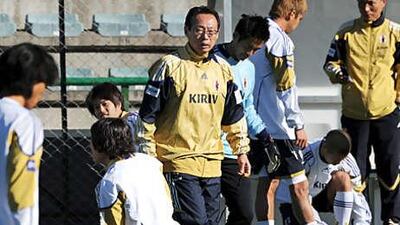PORT ELIZABETH // In contrast to the complex permutations that have made for a thrilling denouement in four World Cup groups over the past two days, there will be no nervous checking of scores needed in the game at the Royal Bafokeng Stadium today. Holland have already qualified from Group E and Cameroon have been eliminated, so the task at hand for Denmark and Japan is straightforward: the Europeans must win and the Asians must not lose in this race for second spot.
Having predicted before the tournament that his side would reach the semi-finals, Takeshi Okada, the Japan coach, calmed expectations on the eve of the game. "To win such a big match, I think in a sense we need something beyond the team's tactics," Okada said. "I really want the players to fight with a solid mentality. "It would be ideal if we can overwhelm the opposition by 10 goals, but it won't be that easy. I think it's going to be a very close, fierce match."
Denmark won the only previous match between the two sides 3-2 in 1971 but, four decades on, the second meeting has all the ingredients of a being classic World Cup encounter. The Danes are looking to reach the second round of the tournament for the fourth time in succession, while Japan have only won once in six meetings with European sides at the finals. With both teams having beaten Cameroon and lost to Holland, Denmark, who reached South Africa after topping a tough European qualifying group that included Portugal, have an inferior goal difference of one so they must secure three points.
A draw, however, would see Japan progress, but the "Blue Samurai" are wary of the fact they have scored only nine goals in 12 World Cup games. A shortage of international class goalscorers continues to plague Japanese football. The predictable, unimaginative nature of the side's attacking style has been a regular criticism since Hidetoshi Nakata, the former Roma playmaker, retired after the 2006 tournament in Germany.
"This difference of one goal, it's just something Japan has never been able to overcome," Okada said. "It's not a problem with only my team, but with all the previous Japan teams and it encompasses a lot of issues." Okada's central defensive partnership of Yuji Nakazawa and the Brazilian-born Marcus Tulio Tanaka - the player who broke Ivory Coast striker Didier Drogba's arm in a pre-tournament friendly - have performed heroics so far in Africa.
The Japan coach expects the duo to be kept busy by the superior physicality of the Danes; Martin Olsen's Scandinavians average eight centimetres taller per man than Okada's players. "How to deal with their height at set plays and their long balls will be our main issues," Okada said. "We have to be sure about how to maintain a solid defence against them." While Okada preaches defensive rigidity coated with attacking sentiment, Olsen's primary concern is that Japan will opt for containment.
"It's difficult these days to score against defensive teams," said the Danish coach. "But we know what we have to do." Denmark are sweating over the fitness of Nicklas Bendtner. The Arsenal striker scored against Cameroon but has struggled with a groin injury in South Africa. "Bendtner is still doubtful, and will continue to be regardless of how far we go in the tournament," Olsen added. emegson@thenational.ae

